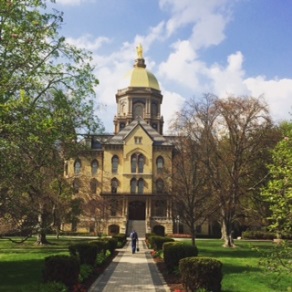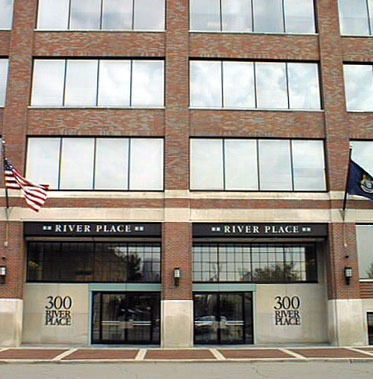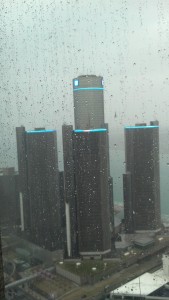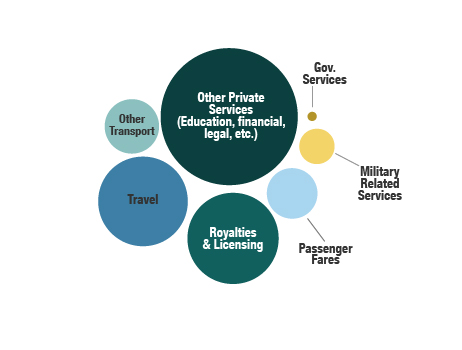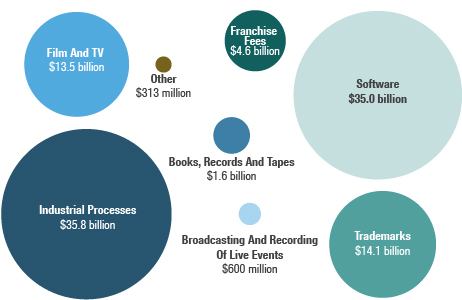A post from our (graduate) student blogger Megan
Wow, this is the twentieth blog I’ve written since August. This is it—the last blog I will ever write for the MSPL. I’m not going to tell you how sad I am because in reality, I’m not. The MSPL has set all of us up for success. I’m excited about the future, proud of my accomplishments, and ready to graduate. And on that note, I want to dispense a little advice to the class of 2016 (read this with a funky beat and some background music kind of like Baz Luhrmann’s “Wear Sunscreen”). So here we go, in no particular order are my top ten tips for success in the MSPL:
- Expand your horizons, do more, go the distance, get the total experience.
If you made it past the admissions gatekeeper at ND—whom I imagine is a larger-than-life bouncer that views lowly candidates with disdain and throws them to the side with a bellowing laugh—then you have reason to celebrate. You have the opportunity to come to Notre Dame. Wait, did you hear me? You’re at THE Notre Dame… Yeah, that school. The school that has movies made about it and filmed right on campus (ever seen Rudy? If you haven’t, you must watch it before you set foot on this campus, trust me, you will be inspired). Take advantage of the opportunities here and meet the standard—it’s high—but it is worth it.
- Get frustrated.
Yep. You will be. At some point during your time here in the MSPL you are going to hit a massive wall like taking an Olympic high dive into a pool, fifty feet deep, full of solid, hardened concrete. Whether it is a tough elective class or an inability to understand the technology that you have to draft a patent application on, you will find difficulty in this program. But difficulty doesn’t mean that it is impossible; on the contrary, it is possible and you will rise to the occasion. When you do hit your wall, stop, step back, take a breath, then resume the task the next day. It will work.
- When opportunity knocks, invite it in for dinner.
My mom wrote this quote in a cookbook she gave me one year. I never got past the cover page and this quote (sorry, I’m not much of a cook). But the quote speaks volumes. Everywhere you turn there is opportunity at this place and in this program. Almost every Friday we had guest lecturers that wanted to help us find jobs. We went to California and DC to network with potential employers. There is career counseling available to the MSPL through the law school and the grad school—we double up in this program—we’re pretty lucky. There is something going on all the time. Do you like sports, go to the football games. You will meet alumni there. Like uncovering a pearl inside a shell, there is some kind of opportunity for you, your career, and your life; just keep unearthing these opportunities— one will lead to the next.
- Network like a rock star.
If you know me, you know that this is my specialty. I love to talk to people one-on-one. I love meeting new people, making connections, and telling everyone about what I am passionate about and hearing the same from them. But even if you don’t love doing this, have no fear. ND is your place if you like science, tech, law, or anything cerebral. And you will likely connect with the people that you have class with or simply sit next to at the next football game. Hang on to these connections; they are worth a lot in the long-run.
- Listen. Did you hear that?
Ok. So.Yeah. This seems simple, right? Well, it’s really not. See, if you’ve been selected to join the MSPL, chances are you are an expert in some field of science, engineering, or law. You must meet certain criteria to get in to this program so you already know a lot and are likely highly educated. However, wise one, you must remember to consider everyone else’s thoughts, emotions, and opinions. Everyone carries their own monologue. Be respectful. Let others talk. You just might learn even more, grasshopper.
- Stop studying. Tour the campus.
Do this for two reasons: first, you’re at Notre Dame—this place is iconic; second, you need to just take a break. There is a lot of work in this program. It is intense, I won’t lie. Do not let this truly awesome place just exist around you, though. Get into it. Go to the Basilica even if you’re not Catholic. They give tours there. It’s pretty. Take a pic of touchdown Jesus when you first arrive in the summer, then one during fall, one with copious amounts of snow, and finally, one when you graduate. Cut and paste all these photos together into one and marvel at how the seasons changed while you were busy building your life. You’ll thank me for that pic on your Instagram profile.
- Do it right or don’t bother.
If you come here thinking that you will put forth minimal effort and you will magically receive a sparkling degree from ND, think again. Patent law is tough, it requires determination. It will take time to learn the law and how to apply that to your technology. Unless you plan to put 100% effort in, it is not worth the time or cost.
- Be patient.
This flows directly from #7. If you want to do something the right way, you will have to be patient. Be patient with yourself and patient with others. Slow down. Ask questions, think before you speak, help those who need it. They will help you; be grateful for this opportunity. There will be times that you will not be patient, but remember, the tortoise wins the race, eventually.
- Make friends, they’re your future co-workers.
If you’ve read the blogs from this past year you know that Catie, Roberto, and I all refer to the MSPL as a “family.” We do this for a reason—we really are like a family. We disagree with one another, we laugh with each other, we spend lots of time together, we fight, we make up; ultimately, even with all our quirks and idiosyncrasies, we are a tight, cohesive group. This is a good thing. If there is one thing I learned from law school, it is to be nice to your classmates. I have contacted them on more than one occasion. Patent law is a small group around the world. At some point, you are going to run into the people that you go to school with here in the future. And most likely, you will work with them, too. Be nice; they know what you went through in the past and will be more willing to be there for you in the future.
- Live, it up. Enjoy it.
Soak up the ND experience! You’ve heard that old saying that “it’s only life after all.” Well, that’s right, it’s just life. But if you’re going to live it, you might as well live it like tomorrow is your last day. Good luck MSPL’ers of 2016. Stay in touch, tweet me: @patlawchick or email me: musovsky@nd.edu. We’re a family, remember that.
